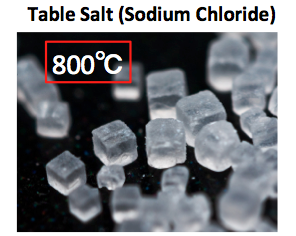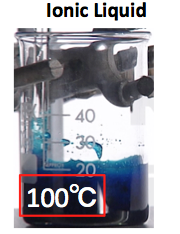Salt is a popular resource with many forms and uses. It helps keep ice off the roads, flavours our foods, and replaces hard metals in our water. In their liquid form, these salts have properties that make them excellent electrolytes (carriers of electric charge), but melting them takes a lot of heat. Table salt, for example, takes about 800 °C to melt, enough to incinerate most of the electronic devices we use. However, the recent discovery of a new class of compounds called ionic liquids may provide a way to use liquid salts as electrolytes in our much cooler environment.

Picture of Table Salt and its melting point
Source: Flickr Creative Commons <https://flic.kr/p/6EQ3Y4>
We had the opportunity to meet with Erin Lindenberg, a PhD candidate in the Chemistry Department at the University of British Columbia. The following video demonstrates and describes what Ionic Liquids are, and how our researcher carried out her experiment.

Video Music: “The Jazz Piano” – http://www.bensound.com
Now, the video showed possibilities in improving the effectiveness of electrolytes, which in the future, may have an impact to the general public through improvements in everyday necessities. However, before anything can be created, scientists must experiment with new concepts and/or theories. In our podcast below, we had a conversation with our researcher on how her study can possibly provide a solution or give ideas to other researchers also studying about Ionic Liquids, along with several challenges faced over the course of her research.
Audio clip: Adobe Flash Player (version 9 or above) is required to play this audio clip. Download the latest version here. You also need to have JavaScript enabled in your browser.
Podcast Music: “Funky Element” – http://www.bensound.com
Modern technology depends on electricity as a source of energy, and portable electronics like cell phones, laptop computers and portable music devices are popular in modern society. Their batteries are essentially packages of electrical energy that can go wherever the device goes, but some of them are big and hazardous with many safety precautions. Erin’s research may lead to the production of smaller and more efficient batteries, possibly making popular electronic devices safer, more portable, and capable of operating longer without charging the batteries.
-Group 2: Lilly Inoue, Michelle Bak, Jared Martin, Sung Hoo Jegal


